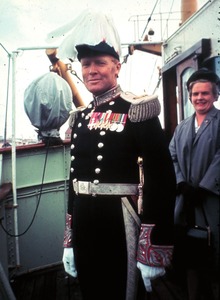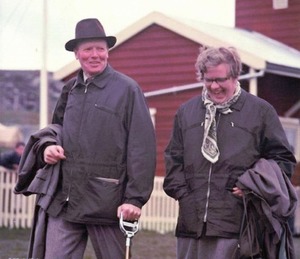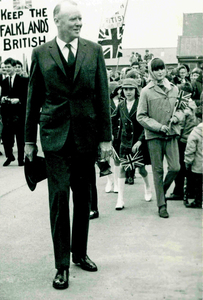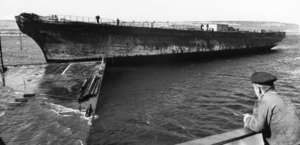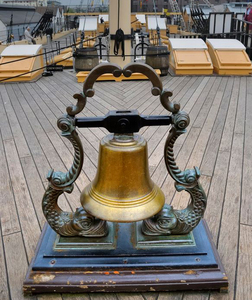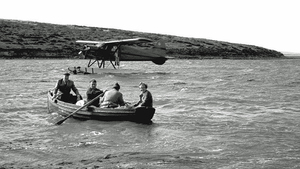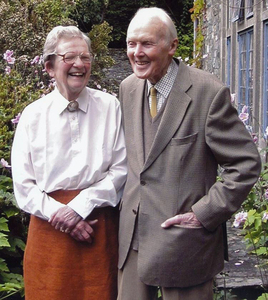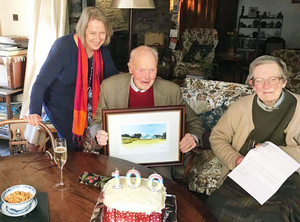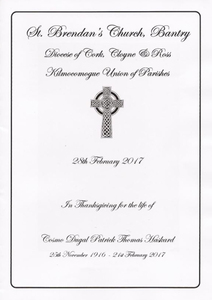HASKARD, COSMO DUGAL PATRICK THOMAS
1916 - 2017 from Ireland
governor, was born on 25 November 1916 in Dublin, the son of John McDougall Haskard, a British army officer and his wife Alicia, née Hutchins, whose family had been landowners in Co Cork. His earliest years were spent in Ireland and England and in 1923 he went with his father to Egypt and two years later to China. In 1928 he was sent back to England to prep school from where he went on to Cheltenham. In 1931 his father, Brigadier-General Haskard, retired and settled near Bantry in Co Cork. Haskard went on to Sandhurst and passed out in second place at the end of the course. However, a chest infection caused him to fail his medical which led to a change in career prospects. In 1937 he entered Pembroke College, Cambridge, to read modern languages with colonial service in mind.
War and Africa
War with Germany becoming increasingly likely, Haskard received a Territorial Army commission at Cambridge and when war broke out he joined the Royal Irish Fusiliers. His application to join the Colonial Service was approved in 1940 and he was posted to Tanganyika {Tanzania}, to be seconded to a Tanganyika battalion of the King's African Rifles (KAR), but a recurrence of his chest infection resulted in a long delay before he was fit to join the 13th KAR and then the 2nd KAR, both of which were Nyasaland battalions. Haskard served in Ceylon {Sri Lanka} and in 1944 in Burma, being awarded the MBE He was demobilised in 1946 with the wartime rank of major.
After his service with Nyasaland troops a transfer from the Tanganyika service to that of the Nyasaland Protectorate {Malawi} was approved and in 1946 Haskard began 18 years of close involvement with that country. Much of his first ten years was spent in district and provincial administration, for which he had a particular liking. The era of travelling on foot in rural areas had not yet passed and Haskard came to acquire a fair knowledge of several districts and, particularly in the Northern Province, he was able to establish a friendly relationship with many leading Africans. He was seconded for a time to the Anglo-Portuguese Boundary Commission, being in charge of fieldwork on the Nyasaland-Mozambique border and twice attending negotiations in Lisbon. In the 1950s the advent of the short-lived Central African Federation, linking Nyasaland more closely to Southern and Northern Rhodesia, gradually brought about an unwelcome deterioration in the previously peaceful relationship between the Africans of Nyasaland and the Protectorate government.
For Haskard one personal event of significance was his marriage in 1957 to Phillada Stanley, at that time working in the secret registry of the secretariat in Zomba. Her father, Sir Robert Stanley, had served in no less than seven colonial territories usually accompanied by his wife and daughter. Phillada Stanley was therefore no stranger to colonial life overseas.
In 1959 the deteriorating political situation in Nyasaland led to the declaration of a state of emergency. Haskard was the provincial commissioner in charge of the Northern Province, the area of greatest unrest, and found himself having to suppress by military force the insurrection of those with whose anti-federation views he had some sympathy. After the troubles, a commission of enquiry, the Devlin Commission, produced a report largely critical of the Protectorate Government but somewhat less censorious of events in the Northern Province. Haskard attributed this in part to the fact that, following army practice, a precise occurrence diary had been kept throughout the three months of the emergency. The diary had been the responsibility of his wife, a volunteer at Northern Province headquarters. In the 1960 New Year Honours Haskard was appointed CMG.
Nyasaland was granted self-government in 1961, two years after the emergency, with Dr Hastings Kamuzu Banda as Chief Minister. Haskard along with other senior expatriate officers became a permanent secretary under an African minister. In the Ministry of Natural Resources he worked directly under Dr Banda himself, an interesting experience. During this period Haskard suffered a recurrence of the same chest complaint which had seriously affected him as a young man. Fortunately on this occasion a Harley Street physician diagnosed the trouble and thanks to a skilful surgeon a full recovery was made.
Governor of the Falkland Islands
In 1964 Haskard was appointed governor of the Falkland Islands and high commissioner for the British Antarctic Territory. He travelled out by sea accompanied by his wife and their son Julian (b1962). It was during this voyage that Haskard learnt of renewed Argentine interest in the Islands and the exploit of the Argentine aviator FITZGERALD landing on Stanley racecourse.
The Haskards found the Falklands a place very much to their liking. The austere beauty of the Islands had much in common with the exposed coast of south-west Ireland; the somewhat conservative way of life was agreeable; the friendliness of the people was reassuring to newcomers. Being accustomed to life in out of the way places, they did not see the absence of an external air service and an overseas telephone link as a disadvantage. Haskard was fortunate in finding WH THOMPSON, the colonial secretary, a kindred spirit who shared many of his views but who did not hesitate to speak his mind effectively when need arose. Haskard was no great innovator: indeed even if he had been, the situation he found in the Falklands did not lend itself to any remarkable change. Wool was still the only substantial source of revenue and, year on year, wool prices were declining. The population was itself in decline and the long-term future of the colony was uncertain.
The Fitzgerald incident reawakened some awareness to the threat from Argentina. Haskard recommended that the platoon of Royal Marines carried by the guardship HMS Protector should remain in the Islands when Protector returned north at the end of the southern summer and this was agreed. In the 1965 New Year Honours, Haskard received a knighthood, the KCMG.
The Haskards tried to get to know, however superficially, as much of the Islands and as many Islanders as possible; almost all farms in the Camp were visited, sometimes by Beaver float plane, sometimes on horseback; the annual horticultural show was revived and a winter show for arts and crafts was started; an annual trip to South Georgia was made and all Antarctic bases except Halley Bay were visited. Government House, where three dances were held each year, was a focus for social gatherings, anyone who cared to sign the book being invited to attend a social function of one kind or other.
Argentine Pressure and British Reactions
A feature of Falkland Islands life was to listen regularly to the BBC World Service which was generally regarded as the mouthpiece of the British Government. On 23 July 1966 listeners were given an unwelcome shock by a surprising broadcast from London of a talk by a member of the Bank of London and South America which seemed to advocate a transfer of sovereignty to Argentina. That such a broadcast should come from London rather than Buenos Aires was the first public indication that the British Government were inclined to appease Argentina. ExCo met the day after the broadcast and Haskard telegraphed to the Commonwealth Office the emphatic view of members that Falkland Islanders had no desire to be handed over to Argentina and that the population wished to retain the closest possible ties with Britain.
From this time onwards the Argentine question became an increasing preoccupation for Haskard. He was the last governor to be appointed under the Colonial Office before it merged with the Commonwealth Office and in both these ministries and in the Foreign Office knowledge about the Falkland Islands was scanty. Public opinion in the Islands lacked political expression and Haskard found himself increasingly engaged in personally conveying to officials in Whitehall what he perceived to be the facts of Islands opinion. In September 1966 he went to London for talks at the Foreign Office about the Anglo-Argentine dispute. Thompson was on leave and the officer administering the government in the Falkland Islands was Leslie GLEADELL, the colonial treasurer. On 28 September an Argentine Aerolineas DC 4 was hijacked by a group of young Argentine nationalists calling themselves CONDOR and made a landing on Stanley racecourse, there being no airfield. Gleadell, a Falkland Islander, acquitted himself creditably in handling a tricky situation, which ended with the enforced but peaceful repatriation of the hijackers to Argentina.
The Condor incident brought the Falkland Islands briefly to public notice in the United Kingdom. Over the next eighteen months a series of consultations took place in Whitehall involving British officials, the Foreign Secretary George BROWN, and the Argentine Ambassador. On two occasions in New York Brown met the Argentine Minister for Foreign Affairs, Costa Mendez. The assumption appeared to be that ultimately the Islands would be handed over to Argentina: the problem was to find a solution acceptable to British public opinion which would secure adequate guarantees for the Islanders but be politically acceptable to the Argentine Government. Discussion centred on how long a period would be needed before Falkland Islands opinion could be brought round to accept a change of sovereignty. The draft outline of a treaty with Argentina was considered: it included a proviso that any change in sovereignty should be acceptable to the Islanders. Subsequently, thought was given to omission of this proviso and substituting a memorandum of understanding attached to the draft treaty explaining that HMG could not transfer sovereignty unless this was acceptable to the people. This memorandum would not be part of the treaty.
Haskard was kept informed of much of what was discussed and he was permitted to take members of ExCo into his confidence to some degree. When on home leave in 1967 he attended meetings at the Commonwealth Office. It was after his return to the Islands in September 1967 that he began to be seriously concerned that HMG was sliding into a position which could have dire consequences for the Islanders. From October to December he addressed a series of letters and telegrams to the Commonwealth Office emphasising Islanders' ignorance of the negotiations, their lack of knowledge of and aversion to Argentina, their very English outlook. He urged delay in negotiations so that Islanders should have time to get accustomed to the possibility of change, pointing out that they were in no way prepared for a statement on the lines envisaged in the draft treaty and memorandum of understanding.
Officials in the Commonwealth Office and the Foreign Office were not inclined to give much weight to Haskard's representations. They felt that while his letters were not encouraging, too much importance should not be attached to them. Haskard was well aware that his opinions were not well received in Whitehall and in January 1968 he requested permission to come to London to present his views personally. This was agreed and he took passage to Montevideo in HMS Protector. A fellow passenger was DM Summerhayes, counsellor at the British Embassy in Buenos Aires, who had just visited the Islands and in a report concluded that the tendency in the Islands would be to postpone for as long as possible any hand-over to Argentine rule, while the Argentines would be eager for a quick transfer. Summerhayes considered the gap between the two attitudes virtually unbridgeable.
In London Haskard had a series of discussions at the Commonwealth Office and the Foreign Office leading up to a difficult meeting with George Brown on 14 February. The following day Brown asked that Haskard should see him again and made amends for some angry remarks he had made at their first meeting. That evening Haskard left by air for Santiago and on to Punta Arenas where the colony vessel MV Forrest awaited him.
Haskard was uncertain whether his London visit would have had any real impact but, unknown to him, his views had been supported from an unexpected quarter. The Ambassador in Buenos Aires, Sir Michael Creswell, having read the Summerhayes report, had telegraphed on 9 February that signing the memorandum of understanding when the Islanders were unprepared to accept its long term implications could lead to friction with Argentina rather than cooperation. In a letter the Ambassador added that his sympathies were really on the side of the Islanders and that he was very much aware of the arguments which had been put forcefully by Haskard.
Back in Stanley on 20 February, Haskard gave ExCo an account of his visit. The Commonwealth Office had instructed him to tell members in confidence of the latest version of the memorandum of understanding and the Argentine alternative wording. But as far as the public was concerned, he was to avoid reference to issues still remaining undecided in London and to the Gibraltar dispute. ExCo met again on the next two days and discussed a draft, which Haskard had prepared, for a public announcement. Members appreciated his personal position but did not like the noncommittal tone of the draft any more than Haskard did himself. The broadcast was made on the evening of 22 February and, as expected, was the subject of adverse comment. The unofficial members of ExCo presented Haskard with a declaration of their dismay that so little attention was being paid to the wishes of the Islanders and of their concern that the British Government proposed sooner or later to act against those wishes. Haskard transmitted this statement to the Commonwealth Office on 24 February.
The initiative now passed to the unofficial members of ExCo, AG BARTON, RV Goss, Sydney MILLER and Christopher BONNER, who on 27 February published a statement sounding the alarm. This was addressed to each member of the British Parliament and to a number of British newspapers. Despite this development, Foreign Office policy remained set to continue the search for a formula which would take sufficient account of Islanders' wishes but would be sufficiently flexible in interpretation to enable agreement with the Argentine Foreign Minister, on the basis that it could be presented to public opinion in the United Kingdom and in the Falklands in one way and to public opinion in Argentina in another. However, the ExCo initiative put such a policy under public scrutiny in Parliament and the British press. A Daily Express reporter named Comben spent a fortnight in the Islands during April and May. His visit led on 2 October 1968 to an Express photographer Matthews taking a well publicised photograph of a large crowd at the whalebone arch in Stanley proclaiming their loyalty to Great Britain.
Lord Chalfont's Visit
On 17 October 1968 the Commonwealth Relations Office was merged with the Foreign Office, always the senior partner. In November the long awaited visit of a government minister to the Islands took place. Lord CHALFONT, on his arrival, was greeted by public demonstrations on the theme of 'Keep the Falklands British'. Chalfont used his considerable negotiating skill in an attempt to persuade Councillors and the public that it was in their long term interest to come to an accommodation with Argentina. He explained in detail to council members the proposed contents of a memorandum of understanding with the Argentine Government and also of a unilateral statement which could be made in Parliament stressing that sovereignty would not be ceded without Islanders' consent. However, Chalfont failed to reassure his audiences. A reminder of Argentine interest in the Islands during Chalfont's visit was the crash landing of a light aircraft, again flown by Fitzgerald, on the Eliza Cove road.
Chalfont's visit left the Islanders uncertain as to what might happen next but the Argentine Government's opposition to the proposed unilateral statement led to failure by the two Governments to agree on sovereignty. On 11 December 1968 the Foreign Secretary, Michael STEWART, who had succeeded George Brown, gave an explicit assurance that HMG would not transfer sovereignty against the wishes of the Falkland Islanders. This statement brought about a much more relaxed attitude within the Islands towards relations with the mainland and meant that contact between HMG and Argentina would henceforth be closely monitored.
Haskard's five year governorship was due to end in September 1969 but in February of that year the unofficial members of Executive and Legislative Councils addressed a request to the secretary of state that Haskard's term of office should be extended. Thompson, the colonial secretary, was due to end his service in May and in view of the political situation it was felt important that there should be a reasonable degree of continuity. Councillors maintained that the Haskards made an excellent team. An extension of a year was approved.
Development and the SS Great Britain.
While reaction to the Argentine claim was Haskard's major preoccupation, throughout his time in the Islands he made a determined effort to encourage the improvement of pastures as a contribution to the prosperity of the sheep farming industry. In this he was supported by forward looking farmers who had already been taking steps in this direction. A grasslands officer had been on the government staff since 1965 but his recommendations lacked the stamp of authority. However in 1967 the Islands were fortunate in having a five-week visit from CW GUILLEBAUD, emeritus university reader in economics at Cambridge. Guillebaud's wide-ranging report on the economy resulted in the rate of profits tax being raised from 2 shillings in the pound to 4 shillings. This increase was linked to an investment allowance which enabled capital investment for pasture improvement to be set off against the additional tax. This was a spur to investment although the depressed state of world wool prices limited the amount of capital available to the sheep farming companies.
In September 1969 Haskard was able to welcome an advisory team of five professionals sponsored by the Ministry of Overseas Development who came to study all aspects of sheep and cattle health and production. The team, led by TH Davies, a grassland agronomist, spent seven months in the Islands, established most friendly relations with the whole farming community and produced a practical report, many recommendations of which were implemented.
In 1970 the Falkland Islands received some satisfactory publicity in the United Kingdom when Brunel's famous ship the Great Britain, which had been decaying in Stanley harbour and at Sparrow Cove for the previous 84 years, was returned to the port of Bristol where she had been built. Public opinion in the Falklands preferred that the ship should remain a landmark where she lay but the imaginative idea that she should be transported across the Atlantic on a pontoon was sufficiently well received for Haskard to recommend to the secretary of state that the Great Britain, a crown wreck, should be repatriated.
In September 1970 the Haskard family left the Falkland Islands on final departure with their son Julian, who had been a pupil at Stanley Junior School. They travelled through South America homeward bound. British Ambassadors along their way were particularly hospitable but Haskard was fully aware that further government employment was unlikely to come his way. After a short spell in England, the Haskards retired to enjoy an active country life in Ireland. They continued to keep in close touch with Falkland Islanders and in 1977, on the initiative of W Hunter CHRISTIE, Haskard was invited to become a vice-president of the Falkland Islands Association.
When the Argentines invaded the Falklands in 1982 the Foreign and Commonwealth Office was unresponsive to Haskard's offer of help but the Haskards were able to provide detailed information and photographs to the SAS and to the 7th Gurkhas. Their son Julian, just commissioned into the 2nd Gurkhas, played a part in this.
In 2004 the Falkland Islands Government approved the name Haskard Rise for a new housing development west of Government House. On Sir Cosmo’s hundredth birthday, the Government presented him with a painting by Vicki Chater and it was hanging above his bed when he died at his home Tragariff on 21 February 2017. His wife Phillada died on 7 July 2017.
External links
See: The Independent November - obituary
See: The Falkland Islands Association - obituary
See: The Church of Ireland - obituary
See: Cosmo Haskard
Comments
Revisions
2006 - Original version
2017 - Updated by David Tatham
November 2019 Five additional photographs added; five external links added
January 2021 One additional photograph added
